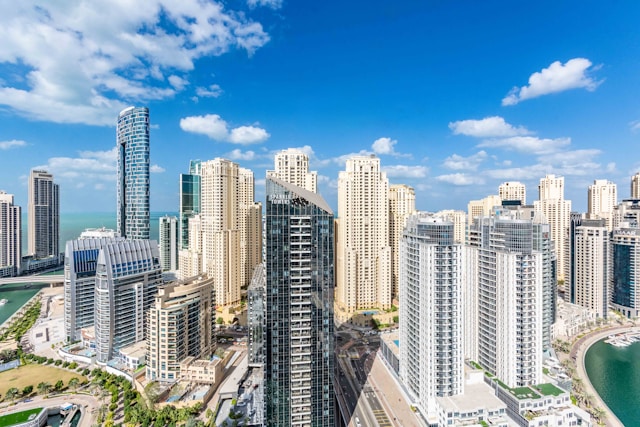Dubai, with its iconic skyline, world-class infrastructure, and thriving economy, is a sought-after destination for professionals, families, and investors. Whether you are moving to Dubai for work, business, or lifestyle reasons, one of the biggest decisions you will face is whether to buy or rent a property. Both options have their advantages and drawbacks, and the right choice depends on your financial situation, long-term plans, and personal preferences. In this comprehensive guide, we’ll explore the pros and cons of buying and renting in Dubai to help you make an informed decision.
The Case for Buying Property in Dubai
1. Long-Term Investment Potential
Dubai’s real estate market has matured significantly over the years, offering a stable environment for property investors. With steady population growth, an expanding economy, and government initiatives aimed at boosting the real estate sector, buying a property in Dubai can be a lucrative long-term investment. Real estate brokers in Dubai play a crucial role in guiding investors through the buying process, ensuring they find properties that align with their goals. Unlike renting, where you pay monthly with no return, purchasing a property allows you to build equity over time.
2. Attractive Payment Plans and Mortgage Options
Many developers in Dubai offer flexible payment plans, making property ownership more accessible. Additionally, banks provide mortgage options with competitive interest rates, allowing expatriates to finance their property purchases. If you plan to stay in Dubai for a long time, buying might be more cost-effective than renting in the long run.
3. Residency Benefits
Investing in real estate in Dubai can make you eligible for a residency visa. The UAE government offers residency visas for property investors, typically for properties valued above AED 750,000. This is an added advantage for expatriates who plan to make Dubai their long-term home.
4. Freedom to Customize Your Home
Owning a home gives you complete control over renovations, interior design, and modifications. Renters, on the other hand, are often restricted by landlords when it comes to making changes to their living spaces.
5. No Rent Hikes or Landlord Issues
Dubai’s rental market can be unpredictable, with fluctuating prices depending on market conditions. By purchasing a property, you can eliminate the risk of sudden rent increases, eviction, or disputes with landlords.
The Downsides of Buying Property in Dubai
1. High Initial Costs
One of the biggest drawbacks of buying property is the high upfront cost. This includes the down payment (usually 20-25% for expatriates), registration fees, real estate agent commissions, and other administrative costs. This can be a significant financial burden compared to the lower upfront costs of renting.
2. Market Fluctuations
While Dubai’s property market has shown resilience, it is not immune to fluctuations. Economic downturns, oversupply, or changes in regulations can impact property values. If you need to sell your property during a downturn, you might face losses or prolonged waiting periods.
3. Maintenance and Service Charges
Homeownership comes with additional costs such as maintenance fees, service charges, and homeowners’ association (HOA) fees. These recurring expenses can add up over time and should be factored into your budget.
4. Commitment and Lack of Flexibility
Buying a home is a long-term commitment, which may not be ideal for those who prefer flexibility. If you plan to relocate in a few years, selling a property may take time and effort compared to simply ending a rental lease.
The Case for Renting in Dubai
1. Lower Upfront Costs
Renting a property in Dubai requires a much lower initial financial commitment compared to buying. Tenants typically need to pay a security deposit (usually 5-10% of the annual rent), real estate agency fees, and the first few months of rent in advance. This makes renting a more accessible option for those who do not want to tie up large amounts of capital.
2. Greater Flexibility
Renting offers more flexibility, especially for expatriates who are uncertain about their long-term plans in Dubai. Lease agreements are typically for one year, making it easier to relocate if needed. If your job requires frequent relocations or you prefer the ability to move to different areas, renting is a more convenient option.
3. No Maintenance Worries
Most maintenance and repair responsibilities fall on the landlord rather than the tenant. This means that renters do not have to worry about costly repairs, property upkeep, or service charges, making renting a hassle-free experience.
4. Access to Prime Locations
For many people, renting allows them to live in prime locations that might be financially out of reach for buyers. Expensive areas like Downtown Dubai, Palm Jumeirah, and Dubai Marina offer stunning properties for rent without the need for a massive investment.
5. No Risk of Market Depreciation
When you rent, you don’t have to worry about property value fluctuations. Homeowners may face financial losses if property prices decline, whereas renters can simply move at the end of their lease without being affected by market downturns.
The Downsides of Renting in Dubai
1. No Equity or Long-Term Investment
Renting means you are paying money each month without building any long-term financial equity. While homeownership allows you to accumulate wealth over time, renting does not offer any financial return.
2. Rent Increases and Lease Uncertainty
Dubai’s rental prices can fluctuate based on market demand, which means tenants may face unexpected rent hikes. Additionally, landlords have the right to sell their property or refuse to renew a lease, causing uncertainty for renters.
3. Limited Personalization
Most landlords do not allow major modifications to rental properties, limiting tenants’ ability to personalize their homes. If having a customized living space is important to you, buying may be the better option.
Making the Right Decision: Buying vs. Renting
When deciding between buying and renting in Dubai, consider the following factors:
- Your Financial Situation: Can you afford the upfront costs of buying, or is renting a more feasible option?
- Your Long-Term Plans: Do you plan to stay in Dubai for the long term, or is your stay temporary?
- Market Conditions: Is the current real estate market favorable for buyers or renters?
- Lifestyle Preferences: Do you value stability and ownership, or do you prefer the flexibility of renting?
Conclusion
Both buying and renting in Dubai have their pros and cons, and the right choice depends on your individual circumstances. If you are financially prepared and plan to stay in Dubai for the long term, buying a property can be a smart investment. However, if you prioritize flexibility, lower upfront costs, and ease of relocation, renting might be the better option. Ultimately, careful consideration of your finances, lifestyle, and long-term goals will help you make the best decision for your situation.

